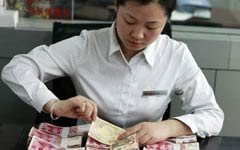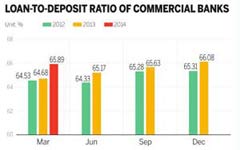Nation to maintain low current account surplus to GDP ratio, official says
The proportion of the current account surplus to gross domestic product in China has been decreasing in recent years and has dropped to a reasonable level that is internationally recognized, the nation's foreign exchange regulator said on Monday.
It fell to less than 4 percent after 2010 and continued to slide to 2 percent in 2013 and 0.3 percent in the first quarter of this year, said Du Peng, chief of the current account department of the State Administration of Foreign Exchange, at a news conference in Beijing.
|
 |

|
Yang Tao, a researcher at the Institute of Finance and Banking at the Chinese Academy of Social Sciences, said: "In the past, Chinese leaders had an extensive growth mind-set, but now they are adjusting the export-oriented policy of economic development. The government is discouraging exports from high-polluting, energy-intensive industries rather than giving tacit consent."
Li Wei, a Shanghai-based economist at Standard Chartered Plc, said the restructuring is a slow process, and it may take several years to fully digest the policies the government has launched. He expects that the proportion of current account surplus to GDP will rebound slightly to 3.5 percent this year.
While the goods trade surplus will improve due to an increasing demand for exports as the economy of developed countries gradually recovers, the service trade deficit is likely to expand because of rising overseas tourism and education by Chinese residents. Therefore, the surplus in the current account, which mainly includes goods and service trade, will keep fluctuating at a low level, Du said.
He also emphasized that the SAFE will continue to monitor changes in international economic and financial development, especially the effects on the Chinese economy of the US' withdrawal from quantitative easing.
"We will prepare an emergency action plan to prevent abnormal inflow and outflow of capital at some point in the future," he said.
Wen Bin, a senior expert in macroeconomics at China Minsheng Banking Corp Ltd, said the Ministry of Commerce wants to maintain steady growth rather than witnessing a huge slump in foreign trade caused by a drop in external demand and the appreciation of the yuan. As a result, the foreign exchange regulator will devote more attention to the capital account surplus and launch regulations to reduce the impact on the domestic economy of short-term, cross-border speculative capital flow.
